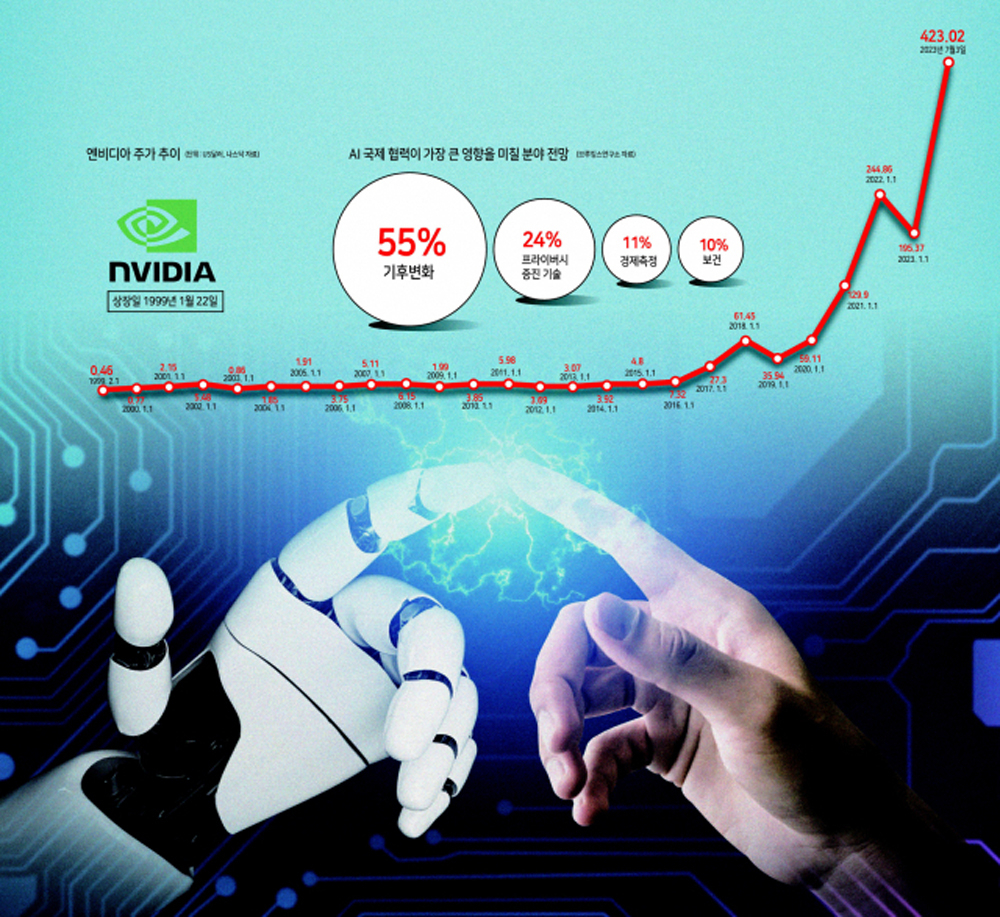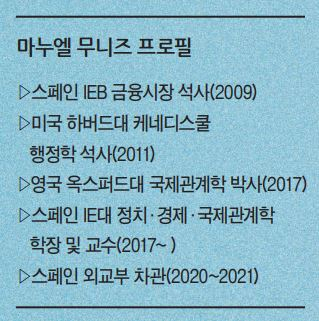이 기사는 해외 석학 기고글 플랫폼 ‘헤럴드 인사이트 컬렉션’에 게재된 기사입니다

During the second half of March of this year the world entered what could be called the AI Era. In the space of two weeks, starting on the 14th of March, we saw the launch of GPT4, Midjourney v5, Bard, AI tools for Copilot and Canva, and many others. The capacity of these tools to create texts, including code, images and video is far more advanced than most experts had predicted. It is, in fact, fair to say that they came at least a decade or two earlier than expected. And, given the exponential nature of technological development, it is now hard to anticipate how the world of AI will look in ten- or fifteen-years’ time. It is certain to be very different from today’s.
So, how will AI shape our world? For starters it is bound to make us more productive. As other technological advances, it will do away with tasks that take humans a long time to complete. This effect will be particularly pronounced in the field of research. We should expect unprecedented advances in the bio and medical sciences, for example. A case in point is the recent breakthrough by AlphaFold, a subsidiary of Google’s DeepMind, which was able to predict a protein’s structure from its amino acid sequence. This feat will have profound implications in medicine development and others.
This explosion in productivity will make AI development and deployment a national priority around the world. Economic competitiveness will be dependent on it. As such, countries will strive to develop, attract and retain talent in the AI field. Efforts will be made to develop a national AI industrial base. This will, in turn, put a premium on the constant and reliable supply of the fundamental ingredients of the AI revolution: data and computing capacity. Suddenly, trade in semiconductors and microchips will become a matter of national import. The stock value of providers of these goods is but an indicator of this change in importance of this market.
The rapid deployment of generative AI tools will also have an impact on employment and, above all, in income distribution. It is evident that I will facilitate the creation of basic text, images and video. This will have deep implications for the professions built around the production of these. If this technology follows a similar pattern to other recent transformational developments, then we should expect it to further reinforce to concentration of income in capital rather than labor. This is to say, the owners of productive capital – entrepreneurs, business owners, and technology developers – will benefit greatly from this revolution. Traditional labor income earners, such as graphic designers, writers or administrative support workers, will most likely not. As such, the AI Era will bring with it a sustainability challenge: making sure that the benefits to productivity and others are well distributed within society.
Quite evidently, AI advances will impact learning. On the one hand they will make the delivery of education across the world significantly easier. Anyone with access to an AI-powered chat bot will, in effect, by able to tap into not just the world’s largest database but also to the most powerful advisor ever built. These bots will produce advice on training and, even, provide the necessary training materials. We should, therefore, expect an explosion of learning. The challenge will lie in adapting to this new reality. This will be particularly hard for academic institutions that refuse to embrace these tools and do not upgrade their pedagogy.
Lastly, the AI Era will have important implications for global politics. We will need to develop a Technology Diplomacy, one dedicated to advancing national interests and values in the technological global arena. Priorities in this space will include guaranteeing the proper use of these technologies, and making sure they comply with some basic ethical standards – particularly as it pertains to their use in social media - limiting their deployment in weapons systems, guaranteeing a transparent and just trading regime around tech, and many others. Some of these issues will require national regulation but many will necessitate a global response.
The AI revolution will bring immense change to our societies. The technology itself is agnostic in its social and economic preferences. It is just a tool. It will be up to us, to our corporations and our governments to build the necessary guardrails that allow for its benefits to outweigh its risks. If governed properly, the promise of AI is a far more productive and prosperous world. One where we can tackle some of Humanity’s most pressing problems: from disease to the lack of education. If not, we face the risk of economic and social fracture, and of deep insecurity. The choice is entirely ours.
*Manuel Muñiz is Provost of IE University in Madrid and Dean of IE’s School of Politics, Economics & Global Affairs

AI혁명發 번영 혹은 분열...가드레일 세워야
지난 3월 하순께 세계는 이른바 ‘인공지능(AI) 시대’에 진입했다. 3월 14일을 시작으로 2주 사이에 ‘GPT-4’ ‘미드저니 v5(Midjourney v5)’ ‘바드(Bard)’, AI 도구인 ‘코파일럿(Copilot)’과 ‘캔바(Canva)’ 등 수많은 도구가 출시됐다. 이들의 코드·이미지·영상 등 텍스트 생성능력은 대다수 전문가의 예측을 훨씬 능가했다. 오히려 예상보다 10~20년 앞서 등장했다고 보는 편이 옳다. 여기에 기술 발전의 기하급수적 성격을 고려하면 10년 또는 15년 뒤 AI세상이 어떻게 변모해 있을지 현재로선 예측하기 어렵다. 분명 현재와 전혀 다른 모습일 것이라고 예상한다.
그렇다면 AI는 세상을 어떻게 변화시킬까.
우선, 생산성은 더 향상될 것이다. 다른 기술적 진보와 마찬가지로 AI로 인해 인간이 처리하는 데에 오랜 시간이 걸리는 작업들은 사라질 운명을 피하기 어렵다. 이 효과는 특히 연구 분야에서 두드러질 수 있다.
가령 바이오·의학 분야에서 유례없는 발전이 예상 가능하다. 알파폴드(Alpha Fold)가 이룬 최근의 성과가 바로 그 예다. 알파폴드는 구글 딥마인드(Google Deep Mind)의 자회사로, 단백질 아미노산 서열을 통해 단백질의 구조 예측에 성공했다. 이는 의약 개발 등에 큰 영향력을 발휘할 것으로 보인다.
이런 폭발적인 생산력 향상에 따라 AI의 개발과 활용은 세계 각국에서 ‘국가적 우선순위’가 될 게 자명하다. 경제적 경쟁력은 이에 좌우될 수밖에 없다. 따라서 각국은 AI 인재를 양성·유치·유지하기 위해 노력할 것이다. 국가적인 AI산업 기반을 마련하려는 노력도 이어질 것으로 전망한다.
그 결과, AI 혁명의 기본 요소인 데이터와 컴퓨팅 용량을 지속적이고 안정적으로 공급할 수 있는 능력이 중요해진다. 갑자기 반도체와 마이크로 칩 거래가 국가적 수입(收入) 문제로 떠오를 것이다. 이 상품들을 만드는 공급업체의 주식가치가 이런 변화를 나타내는 바로미터다.
생성형 AI 도구가 급속도로 활용되면 고용, 특히 소득 분배가 영향을 받게 될 것이다. AI가 기본 텍스트, 이미지 그리고 영상의 생성을 촉진할 것이라는 점은 자명하다. 이들의 생성과 관련한 직업이 갖는 함의도 커지게 된다. 만약 이 기술이 다른 혁신과 비슷한 양상을 보이면 소득은 노동이 아닌 자본에 집중되는 현상이 훨씬 더 뚜렷해질 수 있다.
다시 말해 생산자본을 소유한 기업가, 사업체 대표, 기술개발자 등이 이 혁명의 막대한 수혜자가 될 것이다. 그래픽디자이너, 작가 또는 관리보조원 등 전통적인 노동소득자는 그렇지 않을 가능성이 크다. 그러므로 AI 시대와 더불어 지속 가능성의 문제, 생산성 등에서 생겨나는 혜택이 사회 전체에 잘 배분되도록 하는 문제가 발생하게 된다.
AI의 발전은 당연히 학습에도 영향을 미칠 것이다. 교육 전달이 전 세계적으로 상당히 용이해지면서다. AI 기반의 챗봇을 이용하면 사실상 누구나 세계 최대의 데이터베이스뿐 아니라 지금까지 구축된 가장 강력한 조언자의 도움을 받을 수 있게 된다. 챗봇은 교육에 대한 조언을 생성하고, 심지어 필요한 교육자료를 제공하기도 한다. 그러니 학습의 폭발적 증가도 예상할 수 있다.
문제는 이 새로운 현실에 어떻게 적응해갈 것인가다. 이런 도구의 수용을 거부하고 교수법을 개선하지 않는 학술기관이라면 AI의 발전은 특히 어려운 과제가 될 수 있다.
끝으로 AI 시대는 국제 정치에도 중요한 의미가 있다. 기술 관련 국제무대에서 국가의 이익과 가치를 증진하는 것을 목표로 하는 ‘기술 외교’도 발전시켜야 한다. 이런 각종 기술의 ▷적절한 사용 보장 ▷기본 윤리 기준 준수 보장(특히 소셜미디어의 기술 이용) ▷무기 체계 활용에 대한 한계 설정 ▷투명하고 공정한 거래질서 보장 등을 우선순위로 꼽을 수 있다. 이 쟁점 가운데엔 국가 차원의 규제가 긴요한 것도 있을 테지만 상당수는 전 세계적 대응이 필요하다.
AI 혁명은 우리 사회에 거대한 변화를 몰고 올 것이다. 기술 자체는 사회·경제적으로 ‘가치 중립적’이다. 그저 도구일 따름이다. 기술이 가진 위험성보다 기술의 장점을 더 많이 누리기 위해 필요한 ‘가드레일’을 세우는 건 우리들, 우리 기업과 정부에 달렸다. 제대로 관리한다면 AI는 훨씬 더 생산적이고 번영하는 세상을 만들 수도 있다. 질병에서부터 교육 부족에 이르는, 인류의 가장 시급한 문제를 어느 정도 해결할 수 있는 세상 말이다. 그렇지 않다면 우리는 경제·사회적 분열과 깊은 불안에 빠지게 될지도 모른다. 선택은 전적으로 우리의 몫이다.
마누엘 무니즈 스페인 IE대 학장









